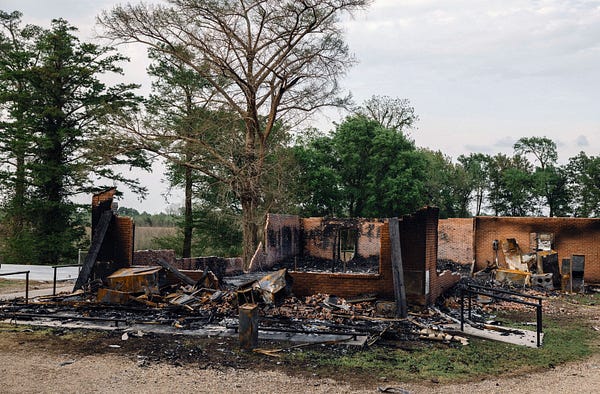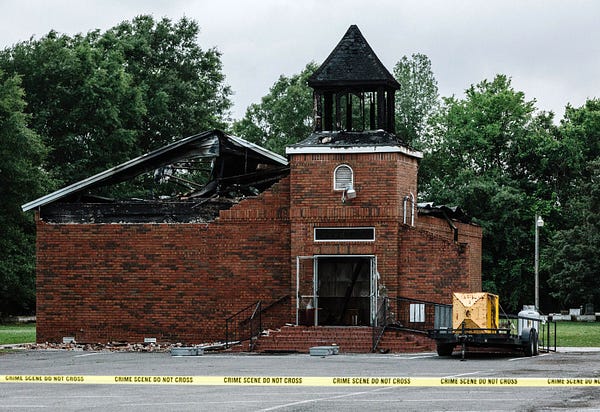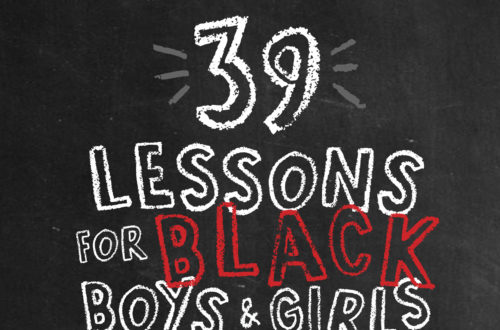Three black churches were set ablaze over the course of 10 days in Louisiana and the charred remains are pretty much the sum total of how much we seem to care.
From March 26 through April 4, St. Mary Baptist Church in Port Barre, Greater Union Baptist Church and Mount Pleasant Baptist Church in Opelousas were victims of arson. These churches had been pillars of their communities for more than 100 years and, tragically, they also have the same arsonist in common, who happens to be the son of a deputy sheriff in the district.
This is especially disturbing because these fires are reminiscent of the continual assault on black churches in the South during the Jim Crow era, but officials dragged their figurative feet on declaring these as hate crimes. It wasn’t until April 15th (that was just a couple of days ago) that the man responsible was charged accordingly.

There are dozens of other places of worship in the area that makes up St. Landry Parish where these churches were burned down. The racial divide is almost half and half in a population of 84,000. If the arsonist simply had an anti-religion statement to make through his despicable acts, there were dozens of other churches he could have targeted. But he didn’t. He set fire to and demolished sanctuaries that have been the spiritual cornerstone for generations of black people and their families.
Why are we and the media at large quiet about this? Aren’t we the same people who are culturally hypersensitive about the use of words like ██████ or ██████ ? Aren’t we the same people who’ve adopted “cancel culture” when someone executes a standard of behavior that violates the code of decency according to what is deemed social-media-litically correct? So why aren’t we furious that this scumbag not only terrorized several communities, but he also destroyed institutions of historical significance in the state of Louisiana?
Why did it take two weeks after the third fire for Federal authorities to say, “Okay, this might be a hate crime,” when the pattern was obvious? The delay reminds me of a similar state-sponsored reluctance that was a response to when a shooter opened fire on a dozen churchgoers during a prayer service, killing nine and injuring three others.
redact — to hide, remove or censor (parts of a text) before publication or distribution.
Attacks against the black church have been carried out through mass murder, arson, bombings and vandalism. While we don’t like to consider this level of hatred and racism as still existing in 2019, ignoring or redacting it from the history books and the headlines won’t make it any less true.

On September 15, 1963, in a cowardly response to the integration of Alabama schools, Birmingham’s 16th Street Baptist Church was bombed and four little girls were killed. The outrage over this led to the Civil Rights Act of 1964 and the Voting Rights Act of 1965. These were significant pieces of legislation that would change the course of history for black people, the underprivileged and the unheard.
But where’s our outrage now? Why aren’t these atrocities igniting a movement of a similar nature in this day and age?
As children, if we feared there was a monster under the bed, we would stuff our heads under the pillow and hide beneath the covers. This juvenile force field would temper our anxiety until sleep ushered us to safety. But we can’t ignore this.
The evils of our society won’t vanish into thin air like some monster under the bed when we close our eyes tightly and hum ourselves to an ignorant sleep.
In the age of social media, we can no longer point the finger at CNN, FOX and other news outlets as cherry picking what stories they deem worthy of their attention. I mean, sure, they dominate TV screens across the world, but guess who rivals them now. Us.
We are the media now.
Through social media channels, we can generate a conversation or message quicker than any of the news conglomerates. We carry broadcasting stations around in our pockets in the form of cell phones. It starts with us.
So, again… why aren’t we more outraged that three black churches were set ablaze over the course of 10 days in Louisiana?
In the end, we will remember not the words of our enemies, but the silence of our friends.
On Monday, April 15, Paris’ Notre Dame Cathedral burned. People all over the world were fixated in front of screens everywhere as they watched this Gothic stone building topple in flames. The public response was a stark contrast to the aforementioned.
One of my neighbors had literal tears streaming down her face as she told me about it. Since then, the government and a handful of billionaires have led the way in calling for and pledging hundreds of millions of dollars toward the reconstruction effort.
Here’s what I know. It’s unlikely that this place of worship was the target of racism or terrorism. If I were a gambling man, I’d stake my money on this being an accident or negligence at the worst.
Here’s another thing I know. The Catholic church has plenty of money to rebuild if they choose to. They don’t need your money. They’ll take it, but they don’t need as much as so many other ministries and churches who struggle to make rent from month to month.
Imagine if these agencies and philanthropists pledged hundreds of millions of dollars to smaller churches and ministries instead. You know, the ones who are in actual and dire need of assistance; the ones you don’t hear about or that are worthy of media attention? I mean, it is Holy Week. What could be a more appropriate and perfect response? Just imagine it. Or just do it.
But I digress.
There was a Washington Post article that was written in response to the 1996 burnings of black churches, where the author stated, “The people burning down black churches in the South are generally white, male and young, usually economically marginalized or poorly educated, frequently drunk or high on drugs, rarely affiliated with hate groups, but often deeply driven by racism.”
I know. Racism is an ugly word. If you’re white, being called a racist is the hardest thing to respond to or recover from if someone brands you as such. But racism is still real. We can’t redact it from our history just because it soils our origins.
It doesn’t matter how many times you say Christopher Columbus discovered America, it won’t be true. He didn’t discover ███. In the same way, the pilgrims didn’t have a potluck with the native Americans, Thomas Edison didn’t solely invent the lightbulb and so on.
A redacted history may change the narrative, but history is unchanging no matter what we say.
It’s 2019. We can do better. We don’t need to redact, amend or hide from the truth. We simply need to have the right response to what is happening around us. Whether black or white or any of the myriad of cultures that make up us, we have to do better. We have to acknowledge that we are no better than another person.
If one person suffers, we all suffer. If one part is honored, we can all rejoice together.




